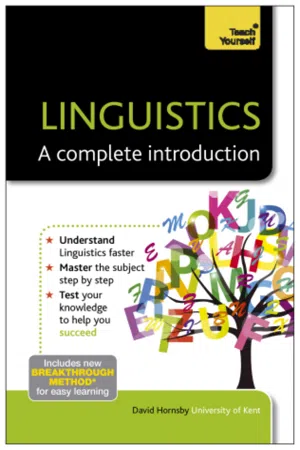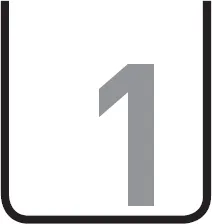
eBook - ePub
Linguistics: A Complete Introduction: Teach Yourself
David Hornsby
This is a test
- 256 pagine
- English
- ePUB (disponibile sull'app)
- Disponibile su iOS e Android
eBook - ePub
Linguistics: A Complete Introduction: Teach Yourself
David Hornsby
Dettagli del libro
Anteprima del libro
Indice dei contenuti
Citazioni
Informazioni sul libro
Written by David Hornsby, who is a current Linguistics lecturer and researcher at the
University of Kent, Linguistics - The Essentials is designed to give you everything you need to succeed, all in one place. It covers the key areas that students are expected to be confident in, outlining the basics in clear jargon-free English, and then providing added value features like summaries of key books, and even lists of questions you might be asked in your seminar or exam.
The book uses a structure that mirrors many university courses on linguistics - with
separate chapters focusing on linguistic thought, syntax, sound systems, morphology,
semantics, pragmatics, language acquisition, and much more.
Domande frequenti
Come faccio ad annullare l'abbonamento?
È semplicissimo: basta accedere alla sezione Account nelle Impostazioni e cliccare su "Annulla abbonamento". Dopo la cancellazione, l'abbonamento rimarrà attivo per il periodo rimanente già pagato. Per maggiori informazioni, clicca qui
È possibile scaricare libri? Se sì, come?
Al momento è possibile scaricare tramite l'app tutti i nostri libri ePub mobile-friendly. Anche la maggior parte dei nostri PDF è scaricabile e stiamo lavorando per rendere disponibile quanto prima il download di tutti gli altri file. Per maggiori informazioni, clicca qui
Che differenza c'è tra i piani?
Entrambi i piani ti danno accesso illimitato alla libreria e a tutte le funzionalità di Perlego. Le uniche differenze sono il prezzo e il periodo di abbonamento: con il piano annuale risparmierai circa il 30% rispetto a 12 rate con quello mensile.
Cos'è Perlego?
Perlego è un servizio di abbonamento a testi accademici, che ti permette di accedere a un'intera libreria online a un prezzo inferiore rispetto a quello che pagheresti per acquistare un singolo libro al mese. Con oltre 1 milione di testi suddivisi in più di 1.000 categorie, troverai sicuramente ciò che fa per te! Per maggiori informazioni, clicca qui.
Perlego supporta la sintesi vocale?
Cerca l'icona Sintesi vocale nel prossimo libro che leggerai per verificare se è possibile riprodurre l'audio. Questo strumento permette di leggere il testo a voce alta, evidenziandolo man mano che la lettura procede. Puoi aumentare o diminuire la velocità della sintesi vocale, oppure sospendere la riproduzione. Per maggiori informazioni, clicca qui.
Linguistics: A Complete Introduction: Teach Yourself è disponibile online in formato PDF/ePub?
Sì, puoi accedere a Linguistics: A Complete Introduction: Teach Yourself di David Hornsby in formato PDF e/o ePub, così come ad altri libri molto apprezzati nelle sezioni relative a Languages & Linguistics e Linguistics. Scopri oltre 1 milione di libri disponibili nel nostro catalogo.
Informazioni
Argomento
Languages & LinguisticsCategoria
Linguistics
Thinking like a linguist

Our tasks in this chapter will be to explain what it means to ‘think like a linguist’ and to show how linguists’ assumptions about language often differ from those of the layperson. One might assume, for example, that a linguist would be the first person to turn to when seeking advice on good speech or writing. In fact, few linguists would see it as part of their role to prescribe how language should be used, preferring instead to describe the facts of language as it is used. As we will see later in the chapter, linguists are quick to point out that the bases for our linguistic value judgements generally turn out to be arbitrary, spurious and inconsistent.
In literate societies, we are also used to equating language with its written form, and treating speech as somehow deviant. Linguists make precisely the opposite assumption, reminding us that we all learn our mother tongue at a very young age without the aid of books, and if we learn to read and write in that language at all, we do so only after we have mastered speech. As we will see in this chapter, language looks radically different when we start from a spoken language perspective. It will also become clear that some everyday assumptions we take for granted – for example, the difference between a language and a dialect, or the notion of ‘beautiful’ or ‘primitive’ languages – become highly problematical once our linguistic prejudices are stripped away.

The science of language
It makes sense to start by asking what the term linguistics actually means. The following definition is taken from Collins English Dictionary:
‘Linguistics, n. (functioning as sing.) The scientific study of language’
As a working definition, ‘scientific study of language’ will probably do, but the word ‘scientific’ might appear problematic in this context, because language doesn’t seem to belong to the realm of science in its conventional sense. One certainly doesn’t imagine linguists in laboratories wearing white coats, and it isn’t immediately obvious how one could undertake experiments on language, something that resides ultimately in the head of a native speaker.
It might help if we construe ‘scientific’ here to mean something like ‘objective’, but achieving ‘objectivity’ in linguistics is far from a straightforward task, not least because speakers’ judgements about the same data can differ hugely, making reliable conclusions difficult to draw. For example, while most British English speakers would probably reject the sentence ‘I didn’t do it though but’, it’s perfectly acceptable in some British dialects. Likewise, many English speakers accept ‘innit?’ as a contraction of ‘isn't it?’ but reject it (often vehemently) as a tag question in sentences like: ‘We’re seeing him on Saturday, innit?’ – now commonly used in some varieties of British English. Even for a question as apparently innocuous as ‘Do you speak language X?’, native speaker intuitions may be contradictory or difficult to interpret: responses may be influenced by informants’ attitudes to the language in question (‘Do I approve of X, or even think of it as a proper language? Would I want people to think I use it?’) or to their understanding of the question, which might range from: ‘Do I speak this language every day?’ to ‘Can I understand it, even if I don’t speak it?’, or even ‘Can I manage a few words if the need arises?’ So linguists need to be especially careful when claiming ‘scientific’ objectivity for their findings.
To approach their subject matter objectively, linguists need first to shed a number of everyday assumptions, or ‘language myths’: we’ll be looking at some of these below. The good news is that learning to think like a linguist isn’t difficult: in a real sense, it’s a bit like releasing your inner child, as we’ll see in the next section. A further piece of good news is that, as a native speaker of any language, you’re already in possession of some ‘expert knowledge’! But before you start, you need to grasp two fundamental principles that underpin everything linguists do and that go some way to explaining what ‘scientific’ means for the study of language:
• Principle 1: ‘The spoken language comes first.’
• Principle 2: ‘Linguistics is descriptive, not prescriptive.’
Principle 1: The spoken language comes first
As we saw, thinking as a linguist does is like ‘releasing your inner child’. The following thought experiment will help get you started.
 | Spotlight: Try to forget you can read |
Imagine what your world would be like if the written word were completely alien to you, and letters on the page no more than meaningless squiggles. Since you’re already reading this book, you’re probably finding that quite difficult, but this is of course a world you once knew, albeit when you were rather younger, probably before you started school.

For most adults, the written word takes up a significant proportion of our lives, whether we be reading a novel or daily newspaper, consulting an instruction manual, updating our Facebook status, catching up with the latest Twitter feed or texting a friend. If you’re at university or college, the written word soon becomes a prime focus: you read for a degree, which may well involve writing notes at lectures, where you may be given handouts, and you’ll be asked periodically to commit your thoughts to paper in the form of written essays. Writing is all around us, and modern life and the technological advances we take for granted would be impossible without it.
For linguists, however, writing takes second place to speech. Linguists are not uninterested in the written word: indeed, written material, particularly from earlier, pre-mass media eras, can offer important clues to language structure and linguistic change. Linguists working in the field of literary stylistics devote much of their time to the analysis of written texts. But generally linguists follow the principle of according primacy to speech, for a number of very good reasons:
1 All the world’s existing and extinct natural languages have had native speakers, but only a minority of them have ever had a written form.
While languages such as English, Mandarin, Hindi or Russian all have a long written tradition, many others, particularly those with small numbers of speakers, do not. Many African languages (e.g. Ewe, Wawa, Lugbara), Australian aboriginal languages (e.g. Dyirbal, Warlbiri, Guugu Yimidhirr) and native American languages (e.g. Arawakan, Hopi, Miskito) are not generally used for writing. We know little of the Gaulish language, which was spoken in what is now France before Roman occupation, because Gauls had no written system, and much of what we do know about the language comes from attempts to transcribe it using Latin characters, which were not designed for Gaulish.
Speakers of minority languages in unsympathetic nation states have often been taught that writing is acceptable only in the dominant or ‘official’ language, making it harder for their supporters to develop an accepted written standard if and when those same states later adopt more tolerant attitudes.
Cockney, Brummie, Geordie and Glaswegian (see Case study on next page) have no written form and their speakers are dependent on the conventions of standard English for writing. Estimates put at around 6,000 the number of different languages spoken throughout the world, of which only a fraction have a written form: it would seem perverse – not to say ‘u...
Indice dei contenuti
- Cover
- Title
- Dedication
- Contents
- About the author
- Acknowledgements
- Preface
- How to use this book
- 1 Thinking like a linguist
- 2 A brief history of linguistic thought
- 3 Structural linguistics
- 4 The building blocks of language: describing speech sounds
- 5 Laying the foundations: sound systems in language
- 6 Building words: morphology
- 7 A grammar of sentences: syntax
- 8 The Chomskyan revolution: generative grammar
- 9 Semantics: the meaning of ‘meaning’
- 10 Pragmatics: saying what you mean
- 11 Exploring variation in language
- 12 Choosing your language: multilingualism and language planning
- 13 Mechanisms of language change
- Copyright
Stili delle citazioni per Linguistics: A Complete Introduction: Teach Yourself
APA 6 Citation
Hornsby, D. (2014). Linguistics: A Complete Introduction: Teach Yourself ([edition unavailable]). John Murray Press. Retrieved from https://www.perlego.com/book/3179636/linguistics-a-complete-introduction-teach-yourself-pdf (Original work published 2014)
Chicago Citation
Hornsby, David. (2014) 2014. Linguistics: A Complete Introduction: Teach Yourself. [Edition unavailable]. John Murray Press. https://www.perlego.com/book/3179636/linguistics-a-complete-introduction-teach-yourself-pdf.
Harvard Citation
Hornsby, D. (2014) Linguistics: A Complete Introduction: Teach Yourself. [edition unavailable]. John Murray Press. Available at: https://www.perlego.com/book/3179636/linguistics-a-complete-introduction-teach-yourself-pdf (Accessed: 15 October 2022).
MLA 7 Citation
Hornsby, David. Linguistics: A Complete Introduction: Teach Yourself. [edition unavailable]. John Murray Press, 2014. Web. 15 Oct. 2022.